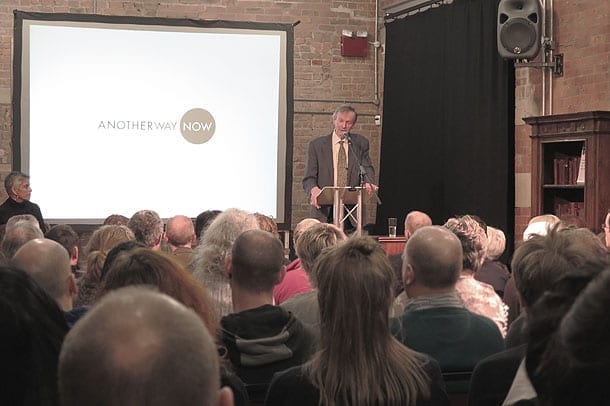Challenging Orthodoxy: Rupert Sheldrake at the Burgess Foundation
- Written by Stephen Lewis
- Last updated 9 years ago
- Culture

Manchester is a city with a history of scientific discovery. It’s the city of John Dalton, Ernest Rutherford, and Alan Turing. It’s also a city with a reputation for radicalism and challenging orthodoxy. The city of the suffragettes and Peterloo. So it was fitting that at the start of 2016, the year in which Manchester is European City of Science, a man who has been called a rebel, troublemaker and a heretic by the scientific establishment came to town. Stephen Lewis went along.
Science is great. Without it there’d be no washing machines, no planes, no mobile phones and no internet. There’d also be no nuclear missiles, no E numbers and no genetically modified food, but that’s another story. But there are some things science can’t explain like telepathy and premonitions. That’s because current scientific thinking is based on the claim that all reality is material. But what if this is not a fact but a belief?
“it is not anti-
scientific to
question
established
beliefs but
central to
science itself”
Rupert Sheldrake is a distinguished biologist and author of more than 80 scientific papers and 11 books, including The Science Delusion and Seven Experiments That Could Change the World: A Do-it-yourself Guide to Revolutionary Science. He is renowned for his unorthodox views and one of a group of internationally known scientists calling for science to be liberated from outmoded and dogmatic ways of thinking.
Dr Sheldrake told a packed audience at the International Anthony Burgess Foundation that science is being held back by a number of assumptions which are widely believed to be true, but which are grounded in materialism, an ideology which dominated scientific thought in the late 19th century and still does today, stifling innovative thinking and creative research.According to scientific materialism, there is no reality but material reality.
He said that there are ten assumptions of modern science. He focused on three in his talk – that matter is unconscious; that consciousness is just the activity of our brains; and that unexplained phenomena like telepathy are illusory.
Scientific materialism is unable to account for the existence of consciousness. If the material world is the only reality, consciousness ought not to exist. And if matter is unconscious, how can unconscious matter generate consciousness in our brains?
The hard problem of consciousness has led to a revival in interest in panpsychism, according to which consciousness is a fundamental property of the universe, and is potentially everywhere and in everything. This view of the world sees it not as a machine like mainstream science, but as a living organism. It’s a belief shared not only by some religions, 17th century philosophers and so-called primitive peoples but by contemporary thinkers such as the American neuroscientist Christof Koch and the atheist philosopher Thomas Nagel, author of Mind and Cosmos: Why the Materialist Neo-Darwinian Conception of Nature is Almost Certainly False.
Another assumption of scientific materialism is that our minds are confined to inside our heads. Again, there is no evidence for this, Dr Sheldrake said, and it’s contradicted by our everyday experience.
If our minds are not confined to our brains but extend invisibly far beyond them like the field from a mobile phone or magnet, it becomes easier to understand psychic phenomena such as the feeling of being stared at, the ability to make people turn round by looking at them, or knowing who is calling when the phone rings. It would also explain why many dog owners claim that their dogs know when they are coming home.
These phenomena are all testable and show a statistically significant success rate, suggesting that telepathy is a normal ability which links members of groups, both human and animal. It is taken for granted in many parts of the world, but is taboo in our culture and dismissed as coincidence because it doesn’t fit the materialist world view.
In attempting to explain such phenomena, we need to look beyond the traditional scientific view that everything is essentially material or physical, including the human mind.
“This is not a descent into superstition,” said Dr Sheldrake. “It is much more unreasonable to be dogmatic and deny the evidence than to look at the evidence with an open mind and to see what’s really going on. We are on the threshold of a tremendous new expansion of our understanding as we break down the limitations of this dogmatic way of thinking.”
Challenging Orthodoxy: An Evening with Rupert Sheldrake was the third in a series of talks with the theme Brave Choices organised by Anotherway Now. The aim of the talks is to inspire thought-provoking conversations. This one certainly did. Dr Sheldrake gave his audience enough food for thought for an eat-as-much-as-you-like Chinese buffet and left them hungry for more.
It’s easy to dismiss what scientific materialism cannot explain as superstition, pseudo-science, and quackery, but quantum physics shows that the world is far more complex than it appears to be, and it may be that there are some phenomena which we cannot explain or even understand.
And where would science be without the courage of those who have challenged the prevailing orthodoxy? Galileo, Darwin and Einstein were once considered heretics.
As Dr Sheldrake says, it is not anti-scientific to question established beliefs but central to science itself.
Have you ever felt someone staring at you? Can you tell who’s calling when the phone rings? Do you have a dog which knows when you’re coming home? Try one of Dr Sheldrake’s experiments online at www.sheldrake.org
For more information about Anotherway Now www.anotherwaynow.com
- This article was last updated 9 years ago.
- It was first published on 26 January 2016 and is subject to be updated from time to time. Please refresh or return to see the latest version.
Did we miss something? Let us know: [email protected]
Want to be the first to receive all the latest news stories, what’s on and events from the heart of Manchester? Sign up here.
Manchester is a successful city, but many people suffer. I Love Manchester helps raise awareness and funds to help improve the lives and prospects of people across Greater Manchester – and we can’t do it without your help. So please support us with what you can so we can continue to spread the love. Thank you in advance!
An email you’ll love. Subscribe to our newsletter to get the latest news stories delivered direct to your inbox.
Got a story worth sharing?
What’s the story? We are all ears when it comes to positive news and inspiring stories. You can send story ideas to [email protected]
While we can’t guarantee to publish everything, we will always consider any enquiry or idea that promotes:
- Independent new openings
- Human interest
- Not-for-profit organisations
- Community Interest Companies (CiCs) and projects
- Charities and charitable initiatives
- Affordability and offers saving people over 20%
For anything else, don’t hesitate to get in touch with us about advertorials (from £350+VAT) and advertising opportunities: [email protected]

“It’s not a ‘no go’ area anymore, it’s a really lovely place” – The reinvention of Ordsall



Didsbury Sports Ground needs your help to rise again after devastating floods















